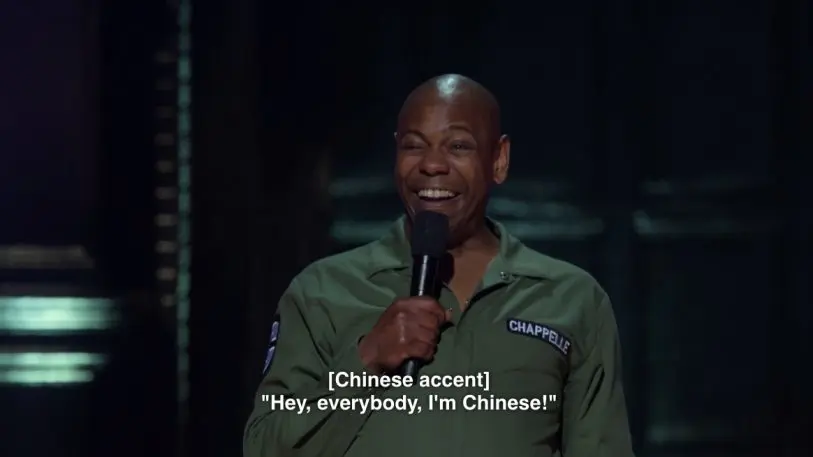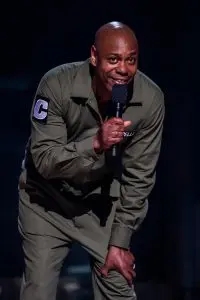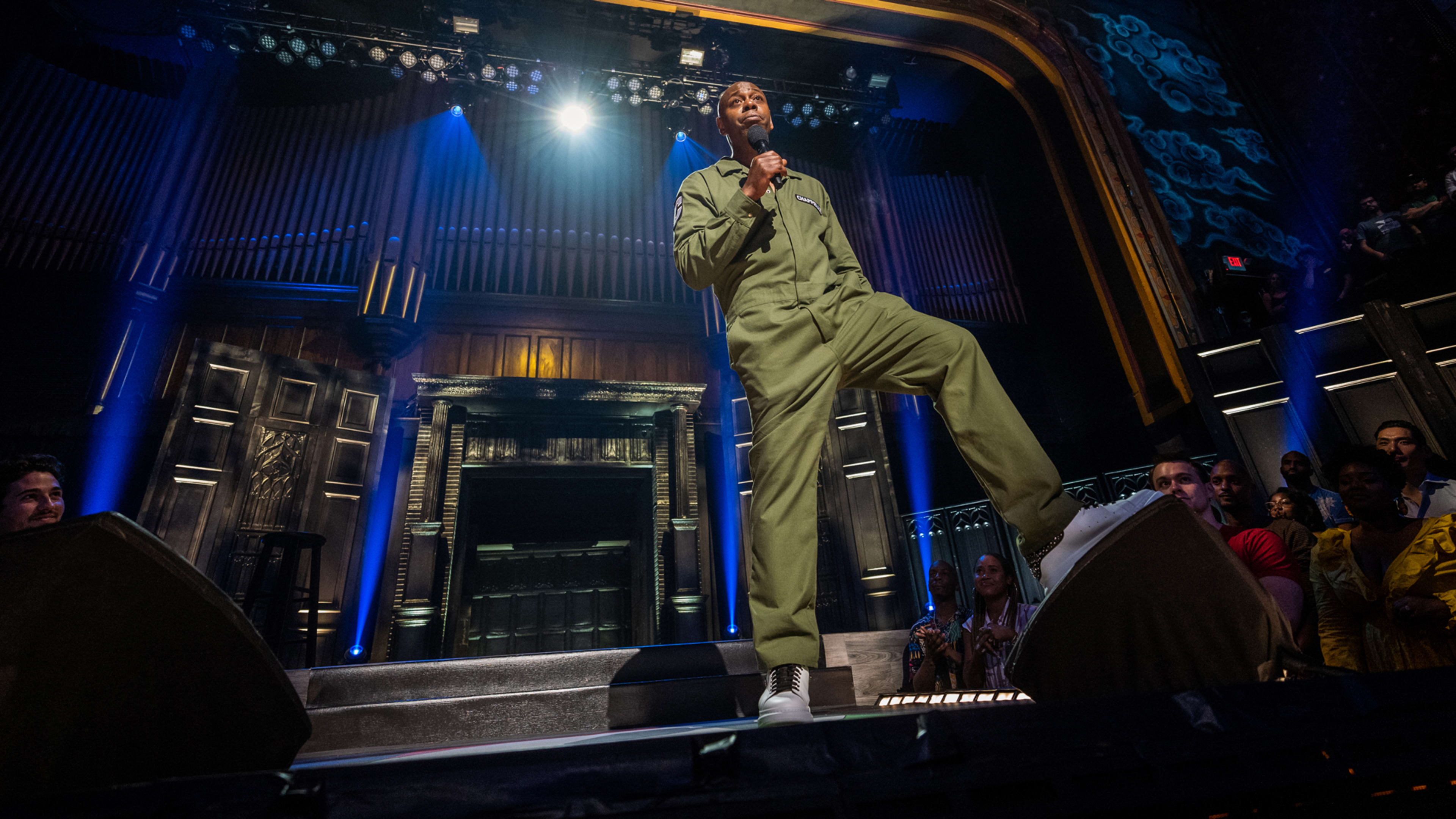Ultimately, the best thing about Dave Chappelle’s just-released special, Sticks and Stones, is that there’s only one of it.
The last two times the comedian released Netflix specials, they were both twofers. Chappelle was apparently bursting with so much creative energy in 2017 that he could only whittle his output down to four hours of shambolic standup comedy. This time, there’s just one special (and a 20-minute post-credits bonus) in which to see whether Chappelle has surgically removed the chip from his shoulder and gotten back to the business of being among the funniest people in the world. He hasn’t.
Before the special even starts, there are some clues as to what we’re getting into here. There’s the title, Sticks and Stones, a Kendrick Lamar quote about being invulnerable to criticism, and there’s Netflix’s auto-roll trailer, featuring narration from Morgan Freeman. One is a defiant taunt from childhood, another is a defiant taunt from adulthood, then there’s a play on the mid-aughts joke that Morgan Freeman narrates everything. Caveat emptor, baby.
Once we’re off to the races, an early bit telegraphs exactly where the special is going. It’s a pair of “impressions.” The first is a funny take on the hypocrisy of the Constitution’s framers, which I won’t spoil, and the second is an impression of the great collective audience in the age of so-called cancel culture. It is juvenile, bitter, and punchline-free. Let’s spoil the shit out of this joke—you can watch it in the tweet below.
the legendary Dave Chappelle on “cancel culture”, from his brand new special. https://t.co/2kP7fFQ3AI
— Stef. 👨🏾💻 (@STEFisDOPE) August 26, 2019
In the midst of complaining about audiences being too complain-y here, Chappelle says, “That’s why I don’t come out and do comedy all the time.” He says those words, with a straight face, during this, his fifth Netflix special in two years. It’s a typical paradox for a program that finds the comedian incensed with the things he can no longer make fun of, while making fun of those things, badly.
What’s frustrating is that there are glimmers of Chappelle’s all-timer status sprinkled throughout the show. Beyond that constitutional bit up top, there are trenchant observations about gun control, the opioid epidemic, and Jussie Smollett. Two out of those three things are not easy to make fun of, and Chappelle deftly manages it in a thought-provoking way that might make you uncomfortable but forces you to identify with his point of view. He is rightfully applauded for those jokes, but at the same level as his applause for the other 90% of the special, which takes low-effort swipes at what might be considered off-limits targets.
He spends ten minutes, a full 1/6 of this special, on the burden of being asked to understand, tolerate, or at least not antagonize the LGBTQ community. A lot has already been said about Chappelle’s jokes about trans people, and I don’t want to add too much to the pile-on, but these jokes seem intended to shock, and what’s most shocking about them to me is their wild unfunniness.
One such bit finds him exploring the premise that if trans people feel they were born in the wrong body, couldn’t he feel born in the wrong race? Here is the punchline of that joke.

Here and throughout the special, Chappelle acts like he’s the last honest man, being persecuted for his willingness to say whatever he wants, despite being crucified (read: awarded Grammys) for it, which is why it needs to be said. It’s a recursive loop, one that mostly exists only in his own mind, and one that leaves him in a place where merely saying the things people get mad at him for (that Michael Jackson’s victims are liars, that R. Kelly should have tried harder to not get caught) is equivalent to making a good joke in and of itself.
In left-leaning comedy spheres (which is, essentially, most of them) there’s something called “clapter,” which is when a comedian makes a dig at the Cheeto Buffoon in the White House or whatever, and the audience goes nuts. It’s a cheap way to get the audience on your side without actually telling much in the way of a joke, and a lot of comedians look down on the practice. The kind of jokes Dave Chappelle now mostly traffics in are the opposite of clapter. People roar at the sheer audacity of saying what certain people are scared to say, or mad that society doesn’t seem to allow them to say, regardless of whether it’s funny. Easy jokes. Unoriginal jokes. The kind of jokes the Ben Shapiros of the world would make were they capable of jokes.
The worst part of Chappelle’s special, though, has to be his spirited defense of Louis C.K. Not because the act of defending Louis C.K. is necessarily beyond the pale, though it’s not great, but because of the lesson he extrapolates from his fellow comedian’s downfall.
“They ruined this n****’s life,” he says. “What the fuck is your agenda, ladies? Is sexism dead? No, in fact: The opposite happened. I said it was gonna get worse, and they said I was tone-deaf, but eight states, including your state [Atlanta] have passed the most stringent anti-abortion law this nation has seen since Roe v. Wade.”

His defense of any and all marquee #MeToo men is just a means, however, to vent his growing displeasure with what he calls cancel culture.
“Celebrity-hunting season,” he says at one point. “They’re going to get everybody eventually. I don’t think I did anything wrong . . . but we’ll see.”
What does he even mean by “get,” though? Which celebrities have been “got”?
“They even got Kevin Hart,” Chappelle says.
Yes, pour one out for Kevin Hart, who you may remember from this summer’s Hobbs and Shaw and The Secret Life of Pets 2 and who you might see in December’s Jumanji 3, and any of the six IMDb credits he has for films beyond 2019. If Kevin Hart got canceled, please God, cancel my ass as soon as possible.
“Canceled” is mostly just internetspeak for “put in a brief social media penalty box.” If you made an offensive comment that isn’t straight-up hate speech (and maybe even then), you may spend a day or so being “canceled” on Twitter. Then you probably apologize, maybe not, and people move on to the next thing. If you get caught committing sex crimes, however, it’s not just a phrase: Your endorsement contracts and scheduled films might get literally canceled. (Or you might get elected to the highest office in the land.) Is that prospect really such an injustice that people like Dave Chappelle need to devote their entire 2019 persona to feeling aggrieved about it? Is he privately rending his garments because Kevin Spacey can’t be on TV anymore?
There is indeed some degree of danger in what Chappelle is afraid of. People on the internet are quick to be offended, and sometimes it gets the better of them. Every time a new SNL cast member is announced, people dutifully search their every tweet looking for a fireable one, which seems like a bad-faith way to use the concept of being offended. On a much higher level, the Trump administration is weaponizing cancel culture by gathering intel on journalists’ most damning internet footprints to use against them. There is a difference between maliciously looking for ways to get someone fired, though, and people deciding they no longer care for the music of R. Kelly. But Chappelle sees it all as the same thing: People out to get him.
But nobody is actually out to get Dave Chappelle. We could simply do without his needlessly offensive, punchline-free jokes, or his whiny victimhood around the backlash they earn. What’s far more instructive than seeing who is offended by (or bored with) the comedian is seeing who his fans are now.
Chappelle once reportedly walked away from a $50-million deal with Comedy Central because one white fan’s laughter at the wrong aspect of a sketch made him wonder whether he had “gone from sending up stereotypes to merely reinforcing them.” In Sticks and Stones, Chappelle makes a powerful, well-constructed joke about gun control, which I will now spoil. He notes that there seems to be no peaceful way to disarm white people, so the only solution is for all black people to get guns . . . because that’s the only way the government will change the laws. It’s a funny and relevant joke about a difficult subject matter, and it’s buried within a special that mostly consists of the star “look, ma, no hands”-ing about far less interesting taboo subject matter. It’s a special that earns this endorsement from former NRA spokesperson and confirmed far-right ghoul Dana Loesch.
Dave Chappelle’s “Sticks and Stones” was hilarious. Glad someone is sticking it to the cancel culture and encouraging people to laugh again. 🤘🏼
— Dana Loesch (@DLoesch) August 28, 2019
Is there a chance that Loesch liked Chappelle’s thoughtful commentary on gun control, or is it more likely she preferred the massive amount of time spent railing against victims of sex crimes just to prove he isn’t afraid of doing so? Whatever exercise in boundary-pushing Dave Chappelle’s current mode started in, it’s gotten out of hand, and it’s attracting some questionable fans with an agenda. He would do well to walk away.
Recognize your brand’s excellence by applying to this year’s Brands That Matter Awards before the early-rate deadline, May 3.
